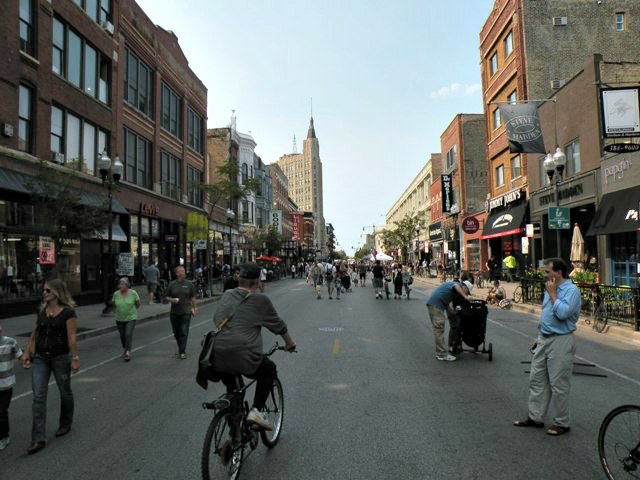Tribune Takes A Kinder, Gentler Anti-Bicyclist Stance
By Chuck Sudo in News on Oct 6, 2014 8:30PM

Photo credit: Chicagoist/Chuck Sudo
Bicyclists across Chicago can always count on the Tribune to write something that will harsh their collective mellow. Except this time the op-ed wasn’t penned by a foaming-at-the-mouth John Kass defending the unassailable right of residents of the western suburbs to take up more space than they need on the road with an SUV.
In fact, the op-ed in today’s Tribune by Ron Grossman raises some good points about the need to share Chicago’s streets from the pedestrian’s point of view. Grossman begins by recounting an incident that happened to him over the summer.
I had a green light, and while conscious of a bicyclist coming down Lincoln, I assumed she would stop for the red light she was facing, or at least slow down. But she kept on coming, and I hate to think of the resulting damage to her bike and my body had I not jumped out of the way. Without so much as looking back over her shoulder, she flipped me the bird. I guess she thought that, even though I had a "walk" light, I should have deferred to her right to go through a red light unimpeded.
We don’t live in a vacuum here. We recognize bicyclists like the one Grossman described—which not all of us are—pose as much of a danger to pedestrians as motorists do to cyclists and pedestrians.
Grossman continues.
That sense of entitlement has been given a municipal stamp of approval, at least to judge from a sidewalk sign at the northwest corner of Dearborn and Randolph streets: "LOOK!" it reads, with a stick figure bicyclist perched between the two O's. "BE SAFE BE ALERT," it cautions, a message carrying the imprimatur of "CDOT," the Chicago Department of Transportation. The warning is repeated just off the curb, where the pedestrian-crossing lane intersects a bicycle lane: "LOOK BIKES."Logically, a more appropriate warning sign would face the flow of bicycle traffic, reminding bicyclists that they have an obligation to obey the law.
In effect, the CDOT warning signs for pedestrians are disclaimers. To my eye, they are the city's way of saying to its non-cycling citizens: "You are on your own. Don't look to us to protect you by enforcing the traffic laws."
There's enough blame to be shouldered here. Anyone who's biked downtown can admit there are as many pedestrians blindly walking into traffic as there are cyclists barreling through a red light. One thing Grossman failed to mention: the Dearborn Street bike lane was voted the best in America, with stoplight compliance soaring from 31 percent to 81 percent and bike traffic more than doubling since the lane went in. In short, the lane is doing what was intended, which is making the flow of traffic safer.
Grossman does go off on a bit of a “get off my lawn” rant before composing himself, but his central argument is still valid. The scores of law-abiding bicyclists get lost in the broad gestures of the ones who blow through stop signs and red lights; the ones who pedal against traffic or on crowded sidewalks; the cyclists who are quick to flip off a pedestrian or motorist for an accident they nearly caused by an equally unassailable assumption that they have the right of way.
And it’s a matter of education, or a lack of it. I don’t believe in licensing bicyclists; that would be akin to herding cats. But if bicyclists at least had a basic knowledge of the rules of the road and learned that they’re bound by the same laws as motorists in Illinois, that there is no “slow stop” law in the Land of Lincoln, and that they could be found culpable in an accident if it’s determined they weren’t following the rules of the road, then there wouldn’t be so much animosity between cyclists, motorists and pedestrians.
Grossman, noting events like Bike the Drive, called for a similar event for pedestrians.
Why not give pedestrians a similar holiday by periodically closing the streets to bicycles? Maybe not all of them. But arteries like Milwaukee Avenue, Halsted Street and Devon Avenue that knife through the city's patchwork quilt of ethnic communities.
The Active Transportation Alliance tried that (without the “closing the streets to bikes” bit) with Open Streets Chicago. That event proved popular, but the transit advocacy group had to shut it down after last year’s event.
I would personally rather see the city try to educate everyone—drivers, bikers and walkers—on the rules of the road. It may seem untenable, but if you educate one person, that’s a victory.
Related
Chicagoist's Bike Etiquette Tips